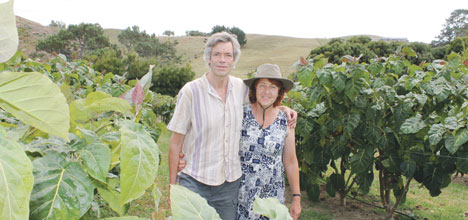Three years ago life was good for Bert and Felicity van der Lee. The tamarillo orchard they had developed was thriving and the fruit the 900 young trees produced was in demand.
As well as selling fresh fruit, the couple had developed a range of tamarillo sauces and chutneys which they sold under their own Crimson Coast brand through the Tauranga Farmers' Market, Mount Maunganui Market and in speciality stores.
Bert and Felicity van der Lee in the orchard they are trying to re-establish after it was hit hard by a disease carried by an introduced insect, the tomato/potato psyllid.
Then a tiny insect carrying a deadly disease flew in, devastating the trees one after another.
'It was awful to see yet another tree dying. It happened so quickly,” says Bert, who often found it hard to go out and inspect the orchard because what he saw was so depressing.
The Crimson Coast orchard, located at Minden near Tauranga, was not alone. Since the tomato/potato psyllid arrived in 2006 by somehow breaching New Zealand's bio-security systems, it has infected orchards in Northland, Hawke's Bay and the Bay of Plenty with Candidatus Liberibacter solanacearum as it feeds on the sap of the trees.
The insect also feeds on tomatoes and potatoes and has seriously affected commercial growers in those industries too.
Felicity says while she feels for kiwifruit growers who are battling with the bacterial disease Psa-V which also got through our borders, the plight of tamarillo, potato and tomato growers due to the psyllid's arrival has gone largely unnoticed.
Serious threat
'It's a serious, serious threat to all our livelihoods and like Psa, now it's here, there is no way to eradicate it.”
The couple had hoped the orchard would provide a living for them and their teenage twins, Daniel and Michelle, but because so many trees died, they have taken on a commercial cleaning franchise to supplement their income.
The psyllid, which is almost too tiny to see, inserts its stylet into the plant, sucks the sap and excretes the excess water and sugar as honey dew or as a solid waste (psyllid sugar). Nymphs and possibly adults inject a toxin into the plants when they feed which causes discolouration of leaves and the plant becomes stunted, exhibiting ‘psyllid yellow' and ‘purple top'. Leaf edges upturn and show yellowing or purpling. The plants internodes shorten and new growth is retarded.
When Bert and Felicity saw signs of the disease, they dug up the trees and burnt them. There were a lot of bonfires the first season. New trees have been planted as the ground is not infected and the couple have also been growing clones taken from their own trees which appear more tolerant to the disease, but it's a slow journey back from the productive orchard they once had.
Tobacco weed
Bert is experimenting with grafting tamarillos onto tobacco weed rootstock in the hope that might give some protection too. Originally that's how tamarillo were grown but as the industry developed, there was a move to growing trees on their own rootstock.
'When we started the orchard I thought we would be able to grow tamarillos virtually organically but all that has changed. To control the insect we now have to use chemical sprays,” says Bert, who applies sprays directly to the under-side of leaves from a backpack sprayer in an effort to get the best coverage.
So far, with careful management, the replacement trees, and the few originals which remain, look healthy. Older trees have set fruit but there are still big gaps in the orchard. However Felicity and Bert aren't giving up – it's not in their nature.
In that they are now one of the few, as there are only around 40 commercial tamarillo growers left in New Zealand from the 120 six years ago. So if they can restore their orchard to close to full production, there should be good returns in future.
Sparkling wine
'It's a great fruit and we have the chance to add value with our sauces and chutneys.”
Bert has even been experimenting with a sparking tamarillo wine.
'It looks and tastes good but doesn't have enough bubbles yet.”
Because the insect impacts several industries, there's a good deal of research going on into ways of controlling it and the hope for the van der Lee family is that improved solutions and more tolerant varieties will be found soon.
'I hope New Zealand doesn't get any more pests. We are so lucky to have a country without snakes and only a couple of poisonous spiders. We don't want anything like that to arrive, or any more pests and diseases to affect our primary producers. I just hope our borders are being carefully watched,” says Felicity.



0 comments
Leave a Comment
You must be logged in to make a comment.